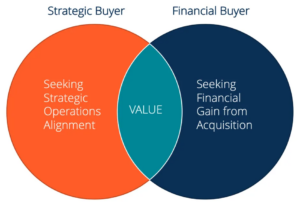
One of the questions we are frequently asked is: ‘who would be interested in buying my business?’ For starters, there are three broad groups that business buyers fit into:
- Owner/Operators
- Strategic Buyers
- Financial Buyers
We want to think about which may apply to your business; understand the pros and cons of each; and build a strategy that would be appropriate for each.
Owners and Operators
Owner/Operators are similar to the current owner, but 20-25 years younger. They will buy a business and be very active in the day-to-day management. Their primary compensation will be the salary/bonuses they take from the business. They likely need to have a skill set similar to the current owner in terms of overall knowledge of the industry. However, they should also have fresh ideas in terms of how the business is run and grows. The buyer needs to be sure he can duplicate or replace all the responsibilities the current owner is managing. Because this is an individual, they will probably need to obtain financing to complete the purchase. This complicates the process because the deal will need to go through a bank’s underwriting process, which takes time. Many of these loans qualify for SBA financing which is very attractive. There are many website portals available to market the business to this group of buyers.
Strategic Buyers
Strategic Buyers are businesses that may find your company an attractive complement to their current business or groups of individuals who are conducting “roll-ups” or consolidations in the industry. These might be a competitor that has an interest in your client base, brand, product mix, service offering, IP, lead generation, sales process, or geographical market.
There could be additional cost-saving efficiencies they could realize because they already support these functions. For example, if you both have finance groups, your business might be attractive because there would not need to be two teams. Consolidators are similar, but instead of buying a single business they are acquiring on a larger scale. They are taking fragmented, local businesses – many times across the country – and bringing them under a national brand to realize the economies and scalability. Their ability to finance the transaction is less of a concern because they are existing companies that have good banking relationships.
A seller can be helpful with drafting a preliminary list if perhaps they’ve been approached in the past, know companies in their industry that may be interested, or can give parameters to build the list for outreach.

Financial Buyers
Financial Buyers are groups like private equity firms and family offices. They may be looking for a single acquisition, or as we mentioned above, a larger consolidation strategy. This group is interested in the return on the investment (ROI) the business can generate from cash flow, and ultimately what they can sell the business for in 3-7 years. They will be looking for enhancements they can aggressively make to revenue growth, cost savings, or both. Sometimes, they will bring in a new management team. However, in most instances, they will want a core existing group to manage the business.
These buyers are well-capitalized so their ability to finance the transaction is not an issue. They are very well versed in this process, so the selling company needs to be prepared for heavy due diligence. We have databases of private equity companies, family office firms, and other contacts for outreach to gauge interest.
Factors Impacting a Seller’s Decision
Which business buyer group is right for you? The answer is not as easy as it seems. There are additional goals that could factor into a seller’s decision and influence which group might be the best fit. Consider the following:
Price: In some instances, obtaining the highest price for the business is the only concern. The legacy of the business does not matter, keeping key employees does not matter, how the existing customer base is managed does not matter – their goal is just to get the highest price. In that instance, a financial or strategic buyer may be the best option.
Employees: There are situations where factors such as how the remaining employees and customers will be treated post-sale is important. An owner/operator or a strategic buyer could be the best option here. This is because the assistance of management and key employees will continue to be necessary for the business to be successful.
Transition: There are other instances where the seller may want to begin a transition but is willing to stay for a period of several years to help run the business. This can be attractive when the seller has additional financial incentives that are tied to an “earn-out”. Financial buyers are often the best fit here.
Regardless of these factors’ degree of importance, it is important to put a plan together as to which group(s) the business is going to be marketed to and to get as much interest from as many prospective business buyers as possible. The best situation is a competitive environment where different prospective buyers are competing on price and terms.
Brentwood Growth
expert business brokers
Brentwood Growth is a leading business brokerage firm with an experienced and trusted team of top business advisors who can assist you with selling your business to relevant buyers for the highest price.
